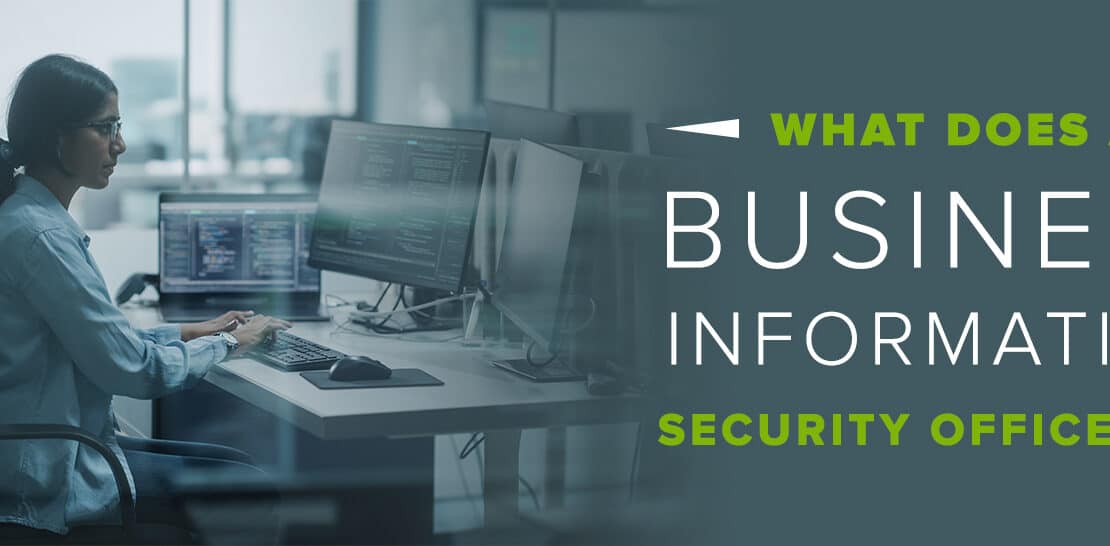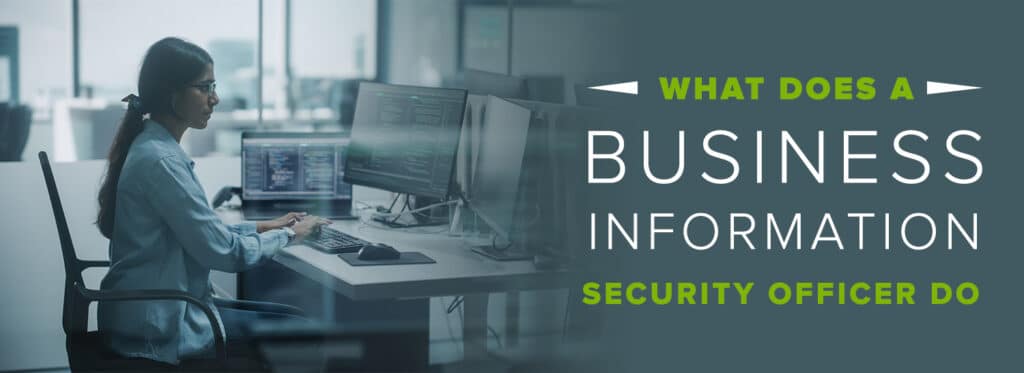- May 16, 2025
- Posted by: Interwest Communications Team
- Categories: News, Uncategorized

Originally posted on September 15, 2023 @ 11:43 pm

What Does a Business Information Security Officer Do?
In today’s digital age, businesses are faced with unprecedented challenges in safeguarding their data and protecting their assets. This is where a Business Information Security Officer, or BISO, comes into play.
And since the BISO is the person who is responsible for developing, implementing, and maintaining effective information security programs, it’s crucial to understand their role in a company.
So, in this article, we will look at what a BISO is responsible for, take a look at their daily tasks, and discuss the future trends that are emerging within this line of profession. But before delving into the details, let’s discuss the role of a BISO within a company.
The Role of a Business Information Security Officer
A business information security officer plays a crucial role in an organization’s overall security, given that they are entrusted with developing and enforcing policies and procedures that safeguard a company’s sensitive information from internal and external threats.
Furthermore, to ensure compliance with industry standards and regulations, they need to work closely with various departments to evaluate and mitigate risks and implement security controls, protecting companies against cyber threats.
So, now that we have understood what a business information security officer does, let’s take a look at some of their main responsibilities that ensure the protection of any company’s sensitive information.
The 8 Main Responsibilities of a Business Information Security Officer
Since a business information security officer is in charge of the company’s data protection, they have multiple responsibilities to carry out within the business. So, to further understand how BISOs protect information, let’s take a closer look at some of these responsibilities:
- Collaborating with IT teams and other stakeholders to implement security controls.
- Developing information security policies and procedures to establish a robust governance framework that aligns with the organization’s objectives.
- Ensuring that policies are communicated effectively across the organization.
- Updating the established framework for data protection to address emerging threats.
- Monitoring the controls and system actively to address impending threats.
- Conducting regular audits on stakeholders to ensure they are following protocol.
- Managing access controls to ensure that only authorized individuals have access to sensitive data.
- Identifying and addressing vulnerabilities by implementing security patches and responding to security incidents in a timely manner.
As you can see, the business information security officer’s job is mainly data protection and everything that falls under that umbrella. Now, to gauge further into the understanding of how they work, let’s take a look into a day in the life of a BISO.
The Daily Tasks of a Business Information Security Officer
Now that we have a clear understanding of the overall role of a BISO, let’s explore some of the daily tasks they undertake to maintain the security and integrity of business information:
Task 1: Ensuring Data Protection
A BISO first needs to ensure the proper functioning of the measures in place to protect the integrity and availability of sensitive data, which includes implementing encryption mechanisms, access controls, and data loss prevention strategies.
To do this, they need to work closely with the organization’s IT department to create strong encryption algorithms that safeguard data that is at rest and active, allowing for unparalleled data protection and the mitigation of possible breaches.
Task 2: Ensuring Compliance with Regulatory Standards
They also need to collaborate with legal teams to ensure that privacy policies and data handling procedures are in compliance with applicable laws and regulations, such as the General Data Protection Regulation (GDPR) in the European Union.
Task 3: Overseeing the Response to Data Breaches
In addition to implementing preventive measures, the BISO also needs to oversee the organization’s response to data breaches and incidents by establishing incident response teams, developing incident response plans, and conducting regular drills.
Furthermore, they need to ensure that the company is prepared in the case of a data breach, which includes coordinating with external parties, such as law enforcement agencies and forensic experts, to investigate and mitigate the impact of data breaches.
Task 4: Assessing and Managing Risks
A BISO also conducts regular risk assessments to identify potential vulnerabilities and threats by evaluating the effectiveness of existing controls and recommending enhancements to reduce risk.
To achieve this, they need to perform vulnerability scans and penetration tests to identify weaknesses in the organization’s network infrastructure and applications. They are also in charge of analyzing the results and working with the IT team to implement additional security controls.
By employing industry-recognized frameworks such as the NIST Cybersecurity Framework, the BISO can effectively prioritize risks and allocate resources to mitigate them to ensure that the risk management strategies are aligned with the business’s objectives and regulatory requirements.
Task 5: Developing Incident Response Plans
When testing the organization’s preparedness in case of data breaches, the BISO conducts tabletop exercises that simulate various security incidents and evaluate the effectiveness of the response plans to further enhance their safety protocols.
It is clear that their expertise and diligence are essential in safeguarding the organization’s sensitive information and maintaining the trust of customers and stakeholders. So, if you want a BISO for your company or are thinking of becoming one yourself, let’s look at the requirements that need to be upheld.
The Required Skills and Qualifications to Become a BISO
To excel in the role of a BISO, individuals must possess a unique blend of technical expertise, interpersonal skills, and business acumen. So let’s take a closer look at what you need in order to become a BISO:
- A strong background in information security, risk management, and compliance frameworks.
- Effective communication and leadership skills, given they need to collaborate with executives, IT teams, and employees.
- Extensive knowledge of the latest industry trends, emerging threats, and technological advancements.
- They need to hold a Certified Information Systems Security Professional (CISSP) or Certified Information Security Manager (CISM), which validates the BISO’s knowledge.
Overall, the role of a business information security officer is multifaceted and requires a comprehensive understanding of information security principles, risk management strategies, and compliance frameworks.
But now that we have fully understood the role of a business information security officer within a company, let’s take a trip to the future to see what advancements and innovations are in store when it comes to the data protection profession.
The Data Breaches of the Future and Their Solutions
As technology continues to advance at a rapid pace, the role of a Business Information Security Officer (BISO) is poised to evolve. So let’s take a look at the following trends that are expected to shape the future of business information security:
| Possible Threats | Solutions |
| As AI becomes more sophisticated, hackers may exploit it to gain unauthorized access to sensitive data. | To prevent this, a BISO needs to collaborate with AI experts to implement robust security measures that adapt to these new circumstances. |
| With the increasing number of connected devices because of the internet of things, the attack by cybercriminals is expanding. | A BISO must ensure that all IoT devices are properly secured, regularly updated, and monitored for any suspicious activities. |
| Cloud computing offers cost savings and scalability, but it also introduces new security risks. | To mitigate these risks, BISOs need to establish strong security controls and ensure that data stored in the cloud is adequately protected. |
| Hackers are now using ransomware to encrypt an organization’s data and demand a ransom for its release. | To mitigate the risk of ransom, a BISO must implement robust backup and recovery systems and regularly test their effectiveness. |
| There is an uprising of social engineering attacks, which are done through psychological manipulation to deceive employees into divulging information. | To mitigate data breaches, BISO must conduct regular security awareness training and implement a multi-factor authentication (MFA) system that enhances security. |
A BISO should actively participate in information sharing forums, collaborate with threat intelligence organizations, and leverage advanced security tools to detect and respond to threats in real-time.
On Your Way To Securing the Safety of Your Business Information
The role of a business information security officer encompasses a wide range of responsibilities and requires a diverse skill set. By effectively managing risks, developing information security policies, and implementing security controls, a BISO plays a critical role in protecting business information and ensuring compliance with regulatory standards.
Looking ahead, the BISO’s role is set to become even more crucial as organizations adapt to technological advancements and face evolving threats in the digital landscape. It is essential for BISOs to stay updated with the latest trends, collaborate with industry experts, and continuously enhance their knowledge and skills to effectively safeguard business information in the future.
